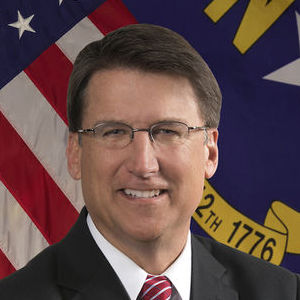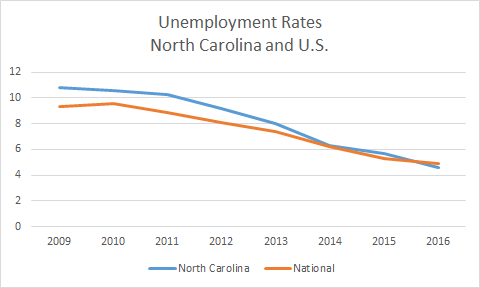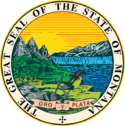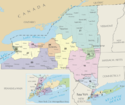Fact check: Is Gov. Pat McCrory's "Carolina Comeback" real?

North Carolina Governor Pat McCrory
November 7, 2016
By Fact Check by Ballotpedia staff
North Carolina Republican Gov. Pat McCrory is running for reelection, in part, on what he calls the state’s economic “comeback” during his tenure. Speaking at an economic development summit in September, he claimed, “The Carolina Comeback is real. Since 2013, North Carolina has one of the fastest growing economies in the nation, unemployment is at an eight-year low and more than 300,000 jobs have been added.”[1]
Are Gov. McCrory’s claims true?
Not entirely. North Carolina’s economy, as measured by real gross domestic product (GDP), is not one of the fastest growing in the nation.[2] The state’s unemployment rate of 4.6 percent does rank at an eight-year low. Between 2013 and 2016, total employment has increased by about 260,000 jobs.
Background
Pat McCrory was elected governor in 2012. From 1995 to 2009, he served as the mayor of Charlotte, the state’s largest city.[3]
McCrory’s main opponent in the general election is Democrat Roy Cooper, who has been the state’s attorney general since 2001. Prior to being elected to his current office, Cooper served in both the North Carolina State Senate and the state House of Representatives.[4] Libertarian Party candidate Lon Cecil, a retired engineer, is also on the ballot.[5]
GDP
According to data compiled by the U.S. Bureau of Economic Analysis (BEA), North Carolina’s real GDP in the first quarter of 2016 was $449.2 billion.[6] GDP growth in the state has improved in each of the past three years compared to three years prior. However, growth in North Carolina’s real GDP has ranked among the top 10 fastest growing states only once since the 2008 recession, and among the top 20 fastest growing states for each of the past three years.[6]
For the first quarter of 2016, North Carolina’s GDP ranked 26th among all states.[7] Among the 12 states in the BEA’s Southeast region, North Carolina ranked ninth, beating Kentucky, Louisiana, and West Virginia.[7]
Unemployment
In August 2016 (the latest data available), North Carolina's unemployent rate was 4.6 percent, 24th among all states.[8][9] North Carolina’s unemployment rate is at an eight-year low, as Gov. McCrory claimed. In 2008, at the start of the financial crisis, the unemployment rate was 6.3 percent.[10] The state’s unemployment rate peaked at 11.3 percent, during the first three months of 2010.[11]
The national unemployment rate has dropped during the same period. In 2008, it was 5.8 percent. It peaked in 2010 at 9.6 percent, and was 4.9 percent in August 2016.[12]

Source: Bureau of Labor Statistics data
Job Creation
North Carolina’s total employment in 2013, the year Gov. McCrory took office, was about 4.03 million jobs.[13] By 2016, the number of jobs had risen to about 4.29 million, a difference of 260,000 (6.5 percent).[8] During the same period, employment increased nationwide by 5.9 percent.[14]
Conclusion
North Carolina Gov. Pat McCrory has been campaigning for reelection, in part, on the growth of the state’s economy during his term in office. “The Carolina Comeback is real,” McCrory said in September. “Since 2013, North Carolina has one of the fastest growing economies in the nation, unemployment is at an eight-year low and more than 300,000 jobs have been added.”
That is not entirely correct, according to federal data. The state’s unemployment rate is at an eight-year low, but North Carolina’s real gross domestic product is not one of the fastest growing in the country. Between 2013 and 2016, total employment has increased by about 260,000 jobs.
See also
- Fact check/Did the North Carolina state crime lab mishandle evidence in hundreds of cases on Attorney General Roy Cooper's watch?
- Fact check/Did North Carolina teachers see the largest average pay increase in the country in 2014, and was the state ranked 42nd in the country for average teacher pay that year?
- North Carolina gubernatorial election, 2016
Launched in October 2015 and active through October 2018, Fact Check by Ballotpedia examined claims made by elected officials, political appointees, and political candidates at the federal, state, and local levels. We evaluated claims made by politicians of all backgrounds and affiliations, subjecting them to the same objective and neutral examination process. As of 2026, Ballotpedia staff periodically review these articles to revaluate and reaffirm our conclusions. Please email us with questions, comments, or concerns about these articles. To learn more about fact-checking, click here.
Sources and Notes
- ↑ Governor Pat McCrory, “Governor McCrory Discusses North Carolina's Growing Economy at Business and Economic Development Summit,” September 12, 2016
- ↑ The U.S. Bureau of Economic Analysis defines a state’s gross domestic product as “the market value of goods and services produced by the labor and property located in a state.”
- ↑ Ballotpedia, “Pat McCrory,” accessed November 7, 2016
- ↑ Cooper served in the state Senate from 1991 to 2001, and the state House for Representatives from 1987 to 1991. Ballotpedia, “Roy Cooper,” accessed November 7, 2016
- ↑ Ballotpedia, “North Carolina gubernatorial election, 2016,” accessed November 7, 2016
- ↑ 6.0 6.1 U.S. Bureau of Economic Analysis, “Regional Data,” accessed November 7, 2016
- ↑ 7.0 7.1 U.S. Bureau of Economic Analysis, “Gross Domestic Product by State: First Quarter 2016,” July 27, 2016
- ↑ 8.0 8.1 Bureau of Labor Statistics, "Economy at a Glance: North Carolina," accessed November 7, 2016
- ↑ Bureau of Labor Statistics, “Local Area Unemployment Statistics: Unemployment Rates for States, Seasonally Adjusted,” accessed November 7, 2016
- ↑ Bureau of Labor Statistics, “Regional and State Unemployment, 2008 Annual Averages,” February 27, 2009
- ↑ Bureau of Labor Statistics, “Databases, Tables, and Calculators by Subject,” accessed November 7, 2016
- ↑ Bureau of Labor Statistics,“Databases, Tables, and Calculators by Subject,” accessed November 7, 2016
- ↑ Bureau of Labor Statistics, “Databases, Tables, and Calculators by Subject,” accessed November 7, 2016
- ↑ Bureau of Labor Statistics, “Databases, Tables, and Calculators by Subject,” accessed November 7, 2016
Contact
More from Fact Check by Ballotpedia
| Fact check/Is Illinois constitutionally required to have a balanced budget before the start of a fiscal year?
November 3, 2016 |
| Fact check/Did Montana spending increase $800 million under Steve Bullock?
November 1, 2016 |
| Fact check/Did John Faso vote against equal pay four times in the New York State Assembly?
October 30, 2016 |
Follow us on Facebook and Twitter








